2023年中考英语总复习课件一轮知识梳理 第03课时 Units 1—4 (冀教版七下)(共46张PPT)
文档属性
| 名称 | 2023年中考英语总复习课件一轮知识梳理 第03课时 Units 1—4 (冀教版七下)(共46张PPT) | 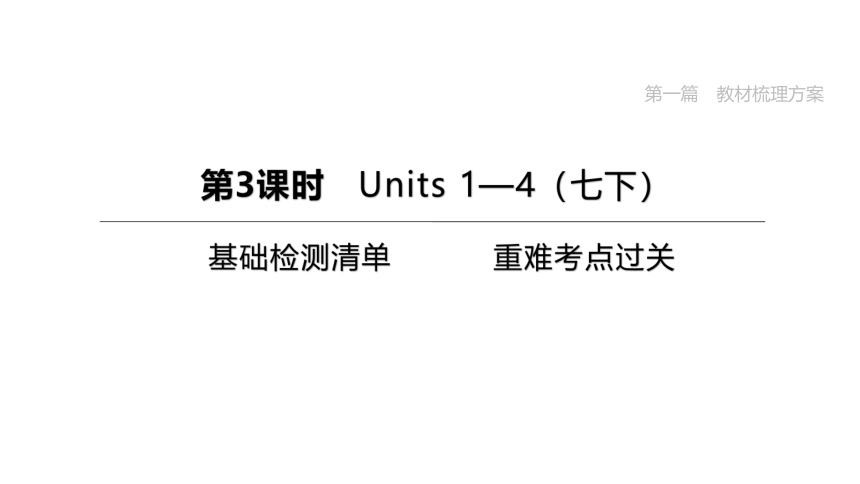 | |
| 格式 | pptx | ||
| 文件大小 | 551.6KB | ||
| 资源类型 | 教案 | ||
| 版本资源 | 冀教版 | ||
| 科目 | 英语 | ||
| 更新时间 | 2023-03-06 21:46:30 | ||
图片预览

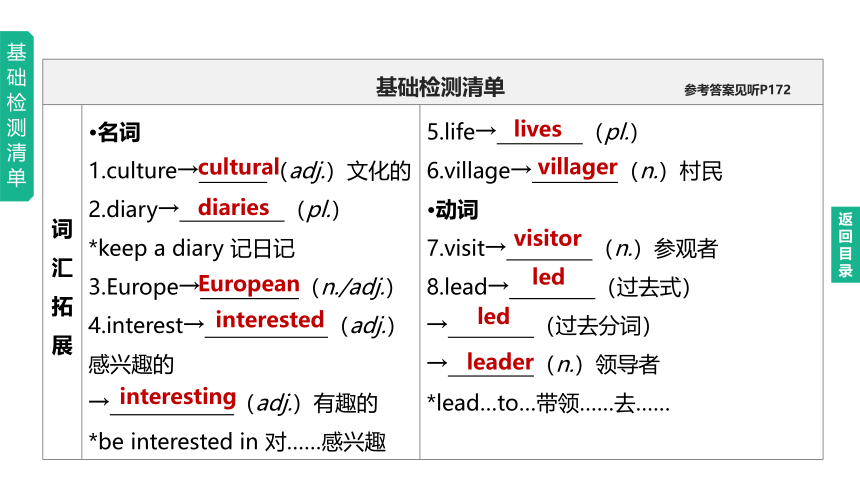
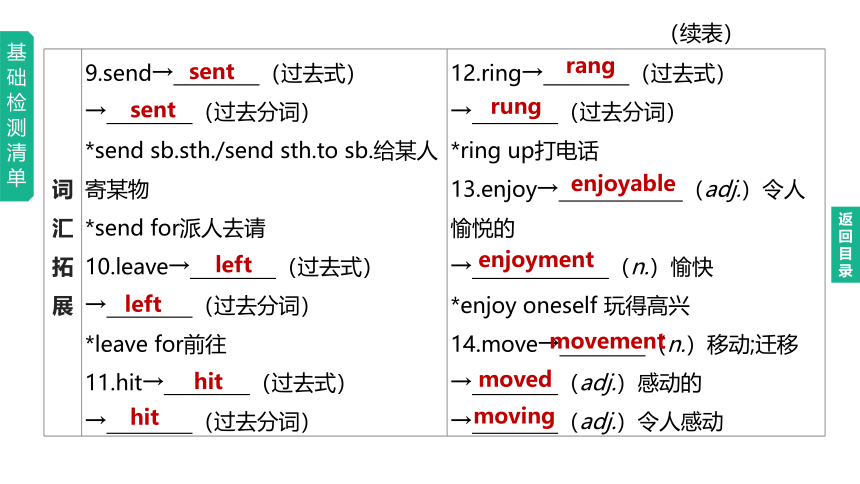

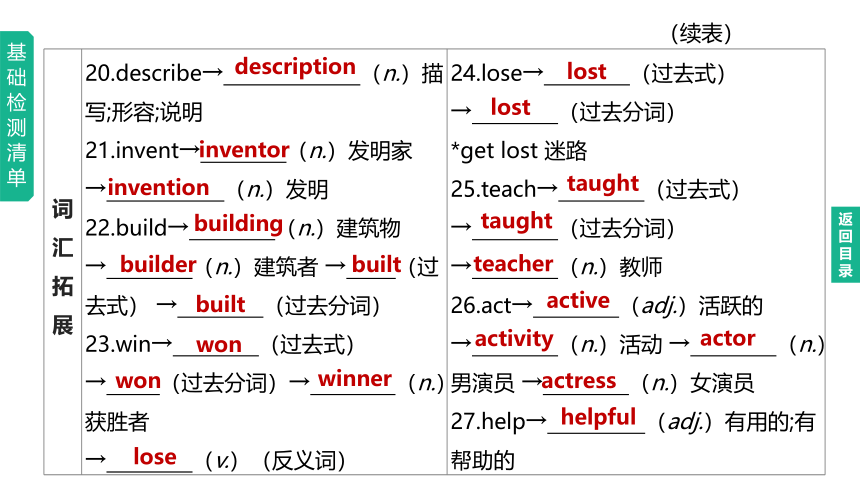
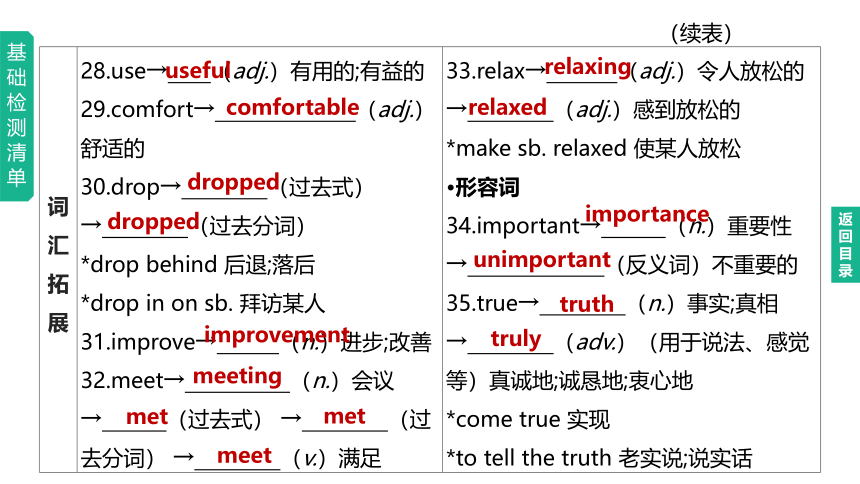
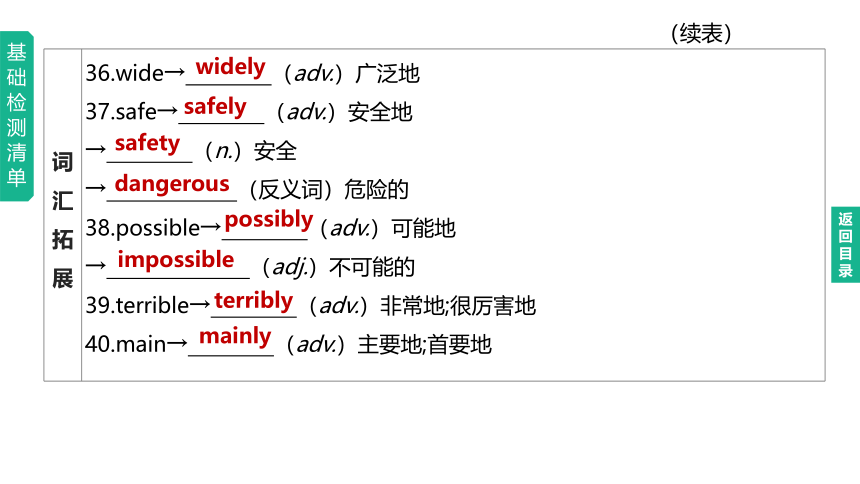
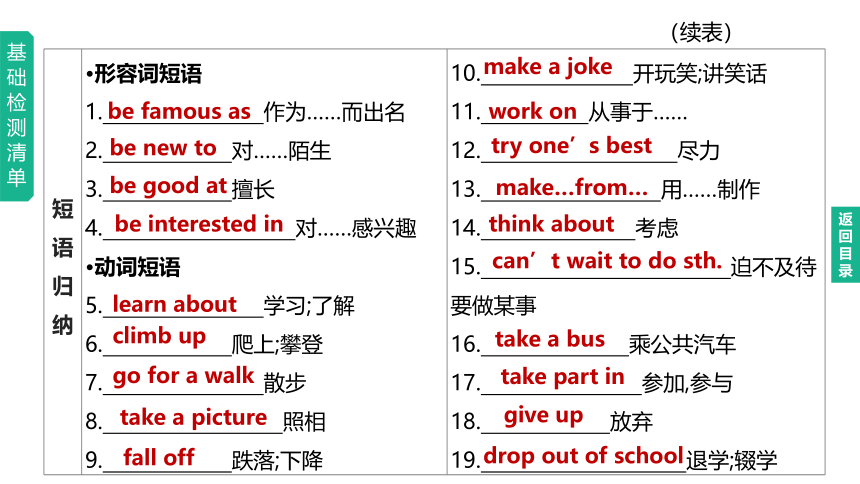
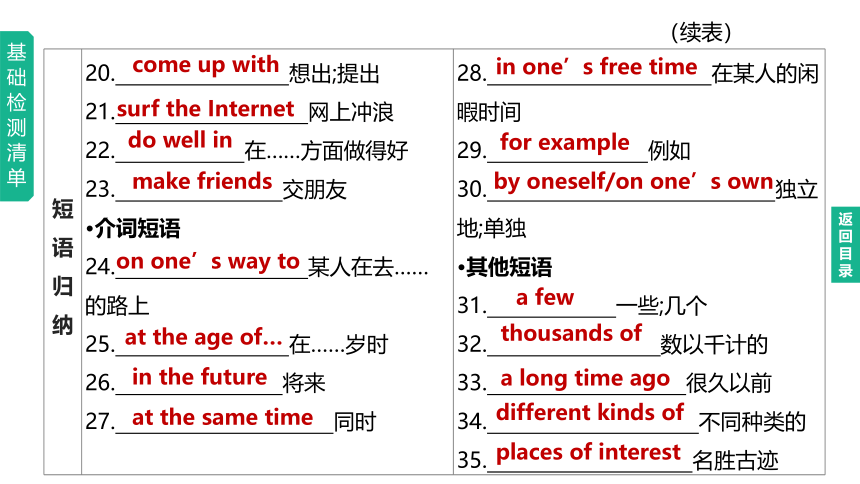
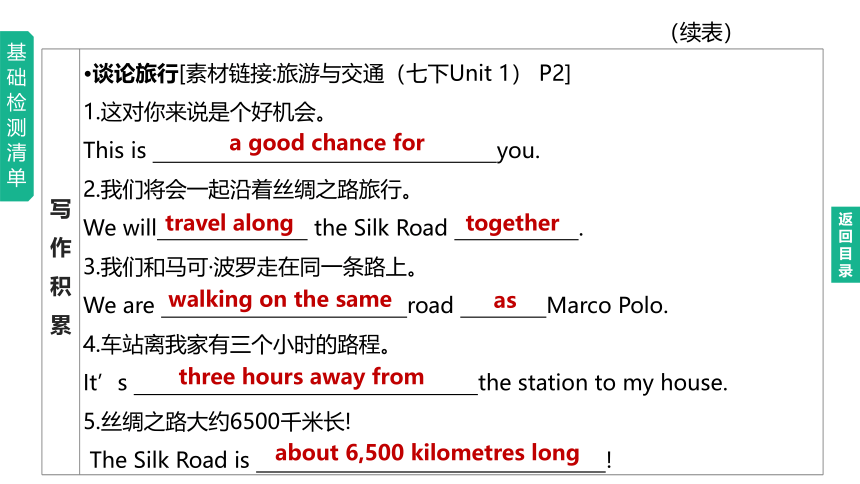
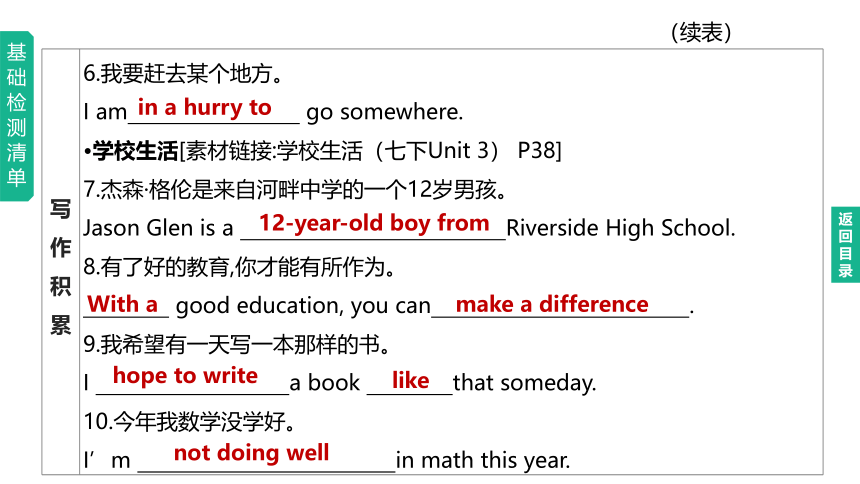
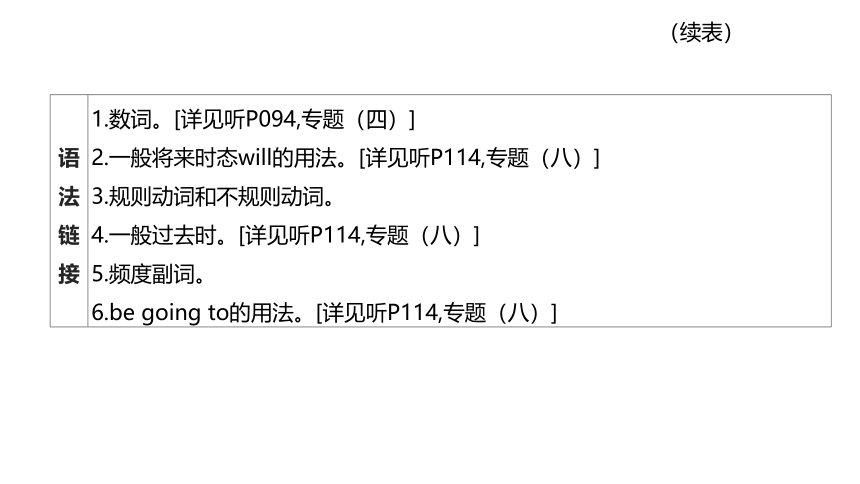
文档简介
(共46张PPT)
第一篇 教材梳理方案
第3课时 Units 1—4(七下)
基础检测清单
重难考点过关
基础检测清单
基础检测清单 参考答案见听P172 词汇拓展 ·名词 1.culture→ (adj.)文化的 2.diary→ (pl.) *keep a diary 记日记 3.Europe→ (n./adj.) 4.interest→ (adj.)感兴趣的 → (adj.)有趣的 *be interested in 对……感兴趣 5.life→ (pl.)
6.village→ (n.)村民
·动词
7.visit→ (n.)参观者
8.lead→ (过去式)
→ (过去分词)
→ (n.)领导者
*lead…to…带领……去……
cultural
diaries
European
interested
leader
villager
visitor
interesting
lives
led
led
词 汇 拓 展 9.send→ (过去式) → (过去分词) *send sb.sth./send sth.to sb.给某人寄某物 *send for派人去请 10.leave→ (过去式) → (过去分词) *leave for前往 11.hit→ (过去式) → (过去分词) 12.ring→ (过去式)
→ (过去分词)
*ring up打电话
13.enjoy→ (adj.)令人愉悦的
→ (n.)愉快
*enjoy oneself 玩得高兴
14.move→ (n.)移动;迁移
→ (adj.)感动的
→ (adj.)令人感动
基础检测清单
(续表)
sent
sent
hit
moved
rang
enjoyable
movement
enjoyment
moving
left
left
hit
rung
词 汇 拓 展 15.cross→ (n.)十字路口 → (prep.)穿过 16.believe→ (过去式) → (过去分词) → (现在分词) → (adj.)可信任的 → (adj.)难以置信的 → (n.)信仰 *believe in 信赖;信任 17.fall→ (过去式)
→ (过去分词)
*fall down (from…)(从……)摔下
*fall behind 落后
*fall over 绊倒
*fall into 落入
*fall asleep入睡
18.hold→ (过去式)
→ (过去分词)
19.discover→ (n.)发现
基础检测清单
(续表)
crossing
believed
believable
unbelievable
fell
believing
fallen
held
discovery
held
believed
across
belief
基础检测清单
词 汇 拓 展 20.describe→ (n.)描写;形容;说明 21.invent→ (n.)发明家 → (n.)发明 22.build→ (n.)建筑物 → (n.)建筑者 → (过去式) → (过去分词) 23.win→ (过去式) → (过去分词)→ (n.)获胜者 → (v.)(反义词) 24.lose→ (过去式)
→ (过去分词)
*get lost 迷路
25.teach→ (过去式)
→ (过去分词)
→ (n.)教师
26.act→ (adj.)活跃的
→ (n.)活动 → (n.)男演员 → (n.)女演员
27.help→ (adj.)有用的;有帮助的
(续表)
description
building
won
won
lost
taught
taught
teacher
inventor
invention
builder
lose
winner
built
built
lost
active
activity
actor
actress
helpful
基础检测清单
词 汇 拓 展 28.use→ (adj.)有用的;有益的 fort→ (adj.)舒适的 30.drop→ (过去式) → (过去分词) *drop behind 后退;落后 *drop in on sb. 拜访某人 31.improve→ (n.)进步;改善 32.meet→ (n.)会议 → (过去式) → (过去分词) → (v.)满足 33.relax→ (adj.)令人放松的
→ (adj.)感到放松的
*make sb. relaxed 使某人放松
·形容词
34.important→ (n.)重要性
→ (反义词)不重要的
35.true→ (n.)事实;真相
→ (adv.)(用于说法、感觉等)真诚地;诚恳地;衷心地
*come true 实现
*to tell the truth 老实说;说实话
(续表)
useful
comfortable
met
met
relaxing
importance
unimportant
dropped
dropped
meet
improvement
meeting
relaxed
truth
truly
基础检测清单
词 汇 拓 展 36.wide→ (adv.)广泛地
37.safe→ (adv.)安全地
→ (n.)安全
→ (反义词)危险的
38.possible→ (adv.)可能地
→ (adj.)不可能的
39.terrible→ (adv.)非常地;很厉害地
40.main→ (adv.)主要地;首要地
(续表)
widely
safely
impossible
possibly
safety
dangerous
terribly
mainly
基础检测清单
短语归纳 ·形容词短语 1. 作为……而出名 2. 对……陌生 3. 擅长 4. 对……感兴趣 ·动词短语 5. 学习;了解 6. 爬上;攀登 7. 散步 8. 照相 9. 跌落;下降 10. 开玩笑;讲笑话
11. 从事于……
12. 尽力
13. 用……制作
14. 考虑
15. 迫不及待要做某事
16. 乘公共汽车
17. 参加,参与
18. 放弃
19. 退学;辍学
(续表)
learn about
think about
be new to
give up
be interested in
climb up
be good at
go for a walk
take a picture
fall off
make a joke
work on
make…from…
be famous as
can’t wait to do sth.
take a bus
take part in
drop out of school
try one’s best
基础检测清单
短语归纳 20. 想出;提出 21. 网上冲浪 22. 在……方面做得好 23. 交朋友 ·介词短语 24. 某人在去……的路上 25. 在……岁时 26. 将来 27. 同时 28. 在某人的闲暇时间
29. 例如
30. 独立地;单独
·其他短语
31. 一些;几个
32. 数以千计的
33. 很久以前
34. 不同种类的
35. 名胜古迹
(续表)
in the future
surf the Internet
do well in
make friends
at the same time
in one’s free time
on one’s way to
at the age of…
for example
by oneself/on one’s own
a few
thousands of
a long time ago
different kinds of
places of interest
come up with
基础检测清单
写作积累 ·谈论旅行[素材链接:旅游与交通(七下Unit 1) P2]
1.这对你来说是个好机会。
This is you.
2.我们将会一起沿着丝绸之路旅行。
We will the Silk Road .
3.我们和马可·波罗走在同一条路上。
We are road Marco Polo.
4.车站离我家有三个小时的路程。
It’s the station to my house.
5.丝绸之路大约6500千米长!
The Silk Road is !
(续表)
together
a good chance for
travel along
three hours away from
walking on the same
as
about 6,500 kilometres long
基础检测清单
写作积累 6.我要赶去某个地方。
I am go somewhere.
·学校生活[素材链接:学校生活(七下Unit 3) P38]
7.杰森·格伦是来自河畔中学的一个12岁男孩。
Jason Glen is a Riverside High School.
8.有了好的教育,你才能有所作为。
good education, you can .
9.我希望有一天写一本那样的书。
I a book that someday.
10.今年我数学没学好。
I’m in math this year.
(续表)
in a hurry to
12-year-old boy from
make a difference
not doing well
like
hope to write
With a
语法链接 1.数词。[详见听P094,专题(四)]
2.一般将来时态will的用法。[详见听P114,专题(八)]
3.规则动词和不规则动词。
4.一般过去时。[详见听P114,专题(八)]
5.频度副词。
6.be going to的用法。[详见听P114,专题(八)]
(续表)
(1)—Alex, why didn’t you answer my call at nine last night
—Sorry, I my mobile phone at home. I basketball in the park with my friends.
A.forgot; played B.forgot; was playing
C.left; played D.left; was playing
(2)Mr. Wang has (leave) for Guangzhou. He will give a speech there in two days.
重难考点过关
1
leave v.动身;出发;离开
D
left
【归纳拓展】
重难考点过关
含义
用法
离开 (1)leave A 离开A地
(2)leave for A 动身去A地
(3)leave A for B 离开A地去B地
遗留; 遗忘 leave sth. at/in+地点 把某物遗忘在……
(注意:forget后只能跟被遗忘的东西,不能接地点)
使保持 某种状态 (1)leave+宾语+宾语补足语
(2)leave…alone 不理会,不管……
(1)Hi, Mom(《你好,李焕英》) won high praise from the
public. I think the film is worth .
A.watched B.to watch
C.watching D.watch
(2)is, book, worth, well, the, reading
.
重难考点过关
2
worth adj.值得(做某事);有价值的
C
The book is well worth reading
【归纳拓展】
【注意】一般来说,worth前可有well, really, very much, hardly等词修饰。
重难考点过关
(1)I want to know what happened my friend. I haven’t heard her recently.
A.on; of B.to; from
C.to; of D.on; from
(2)The 24th Winter Olympic Games will in Beijing and Zhangjiakou in 2022.
A.happen B.take place
C.be happened D.be taken place
重难考点过关
3
happen v.发生
B
B
(3)—Have you met Luke recently
—Yes, I happened him in the science museum yesterday afternoon.
A.meeting B.meet
C.to meeting D.to meet
重难考点过关
D
重难考点过关
【词义辨析】
词条 用法
共同点
happen (2013.55) (1)指偶然、没有预料的“发生”,其结果往往给人带来麻烦或不幸 (2)sb. happen(s) to do sth. 某人碰巧做某事 (3)sth. happen(s) to sb. 某人发生了某事 (1)两者均有“发生”之意,是不及物动词(短语),不能用于被动语态
(2)两者都是非延续性(瞬间)动词(短语),不能与表示时间段的时间状语连用
take place 指必然发生或事先计划好,事情按照预定的方向发生 (1)It is better to travel 10,000 miles than to read 10,000 books, so it’s important to have real with languages, cultures and societies.
A.expression B.experiment
C.examination D.experience
(2)It is a wonderful (经历) to see how they actually make an amazing movie with the 5-D technology.
重难考点过关
4
experience v.&n.体验;经历;经验
D
experience
【归纳拓展】
重难考点过关
(1)Mr. Wang together with his wife and children in the countryside.
A.enjoys living B.enjoy living
C.enjoys to live D.enjoy to live
(2)Boys and girls, I hope all of you will
enjoy (you) during the summer vacation.
重难考点过关
5
enjoy v.喜欢;享受……的乐趣
A
yourselves
重难考点过关
【归纳拓展】
(1)—Nowadays more and more foreigners are becoming in Beijing Opera.
—That’s true. It’s an important part of Chinese culture.
A.interest B.interesting
C.interested D.interests
(2)My father thinks writing is as as reading.
A.interesting B.interested
C.more interesting D.more interested
重难考点过关
6
interest/interesting/interested
C
A
重难考点过关
【词义辨析】
词条
词性及含义
interest
名词,“兴趣;爱好”
动词,“使……感兴趣”
interesting
形容词,“有趣的(修饰物)”
interested 形容词,“对……感兴趣的(修饰人)”,常见搭配:be interested in… 对……感兴趣
7
how far/how old/how many/how much/
how long/how often/how soon
重难考点过关
(1)—Dad, can we reach Huangguoshu Waterfall
—In about an hour.
A.how long B.how soon
C.how often D.how far
B
(2)—Books are our friends. do you read books
—I read books every day.
A.How soon B.How much
C.How often D.How long
重难考点过关
C
(3)—The subway will be in use. Do you know it will take you to get to school by it
—Only ten minutes. It’ll be quick and convenient.
A.how soon B.how often
C.how long D.how far
重难考点过关
C
(4)—Could you tell me it is from your home to People’s Hospital
—Just five minutes on foot.
A.how far B.how long
C.how much D.how soon
重难考点过关
A
重难考点过关
【词义辨析】
词条
含义及用法
how far
意为“多远”,对距离进行提问
how old
意为“多大”,对年龄进行提问
how many
意为“多少”,对可数名词的数量进行提问
how much
意为“多少;多少钱”,对不可数名词的数量或商品的价格进行提问
how long 意为“多长”,询问时间段,对介词for或since引导的时间状语进行提问;也可询问长度
how often
意为“多久一次”,对动作发生的频率进行提问
how soon
意为“多久以后”,一般用于将来时,对介词in引导的时间状语进行提问
重难考点过关
—How often do you do outdoor activities, Tom
汤姆,你多久做一次户外活动
—Twice a week.
一周两次。
8
create/invent/discover
(1)Gilbert electricity and Edison the electric light bulb.
A.discovered; invented B.discovered; discovered
C.invented; invented D.invented; discovered
重难考点过关
A
(2)J.K.Rowling is a great writer. She Harry Potter and other famous characters in her famous novels Harry Potter.
A.found B.created
C.invented D.discovered
重难考点过关
B
重难考点过关
【词义辨析】
词条
用法
create 意为“创造;创建”,指创造出新的东西,其对象往往是精神上的或抽象的,如艺术、文学作品等,其名词形式为creation
invent 表示客观上不存在的事物由人类“发明”出来,其名词形式为invention
discover 表示事物客观上存在,被人类“发现”,其名词形式为discovery
9
join/join in/take part in/attend
(1)—Are you a basketball player in your school
—Yes. I the team 3 years ago. I in it for 3 years.
A.joined; was
B.was joined; am
C.have joined; have been
D.joined; have been
重难考点过关
D
(2)My physics teacher, Mr. Smith, will leave for Shanghai to an important meeting this evening.
A.attend B.join
C.go D.join in
(3)My friends and I will social practice during the summer holiday.
A.join B.take in
C.take part in D.attend
重难考点过关
A
C
重难考点过关
【词义辨析】
词条
用法
join (1)指加入某个党派、团体、组织等, 成为其成员之一
(2)和某人一起做某事, 其结构为: join sb.in (doing) sth.
join in
多指参加小规模的活动, 如球赛、游戏等, 常用于日常口语
take part in 多指参加或参与群众性的活动、运动、会议等并在其中发挥作用
attend 指参加会议、婚礼、葬礼、典礼或去上课、上学、听报告等
【图解助记】
重难考点过关
10
hope/wish
(1)I that one day I could fly to the moon and say hello to Chang’e and Yutu.
A.wish B.hope C.think D.agree
(2)Fred hopes his spoken English, so he practices it every day.
A.improve B.improves
C.improving D.to improve
重难考点过关
A
D
(3)birthday, wished, a, her, happy, I
.
重难考点过关
I wished her a happy birthday
【词义辨析】
重难考点过关
词条 含义
用法
hope 意为“希望”,一般 表示可实现的愿望 hope to do sth.
hope+(that)从句
wish (2019.82) 意为“希望”,后 接从句时,一般表示 无法实现的愿望 wish sb. sth.
wish to do sth.
wish sb. to do sth.
wish+(that)从句
11
Why don’t you learn a traditional Chinese dance
你为什么不学习一种中国的传统舞蹈呢
(1)—There are so many used books in a mess. I wonder how to deal with the used books.
— give them away to the poor children
A.Why not B.Why don’t
C.What about D.Would you mind
重难考点过关
A
(2)—Shall we go fishing at six o’clock tomorrow morning
— . Will seven o’clock be OK
A.It’s up to you B.No problem
C.I can’t make it D.It’s a good idea
重难考点过关
C
(3)Would you like (go) to the Summer Palace this afternoon
(4)What about (have) a picnic on the beach
(5)don’t, go shopping, me, you, why, with
重难考点过关
to do
having
Why don’t you go shopping with me
【归纳拓展】
(1)“Why don’t you do sth. ”意为“你为什么不做某事呢 ”表示提建议,相当于“Why not do sth. ”
(2)常用的肯定答语:“OK!”“All right!”“Good idea!”“Sounds great.”等。常用的否定答语:“Sorry, I…”“I’m afraid not.”等。
重难考点过关
(3)
重难考点过关
第一篇 教材梳理方案
第3课时 Units 1—4(七下)
基础检测清单
重难考点过关
基础检测清单
基础检测清单 参考答案见听P172 词汇拓展 ·名词 1.culture→ (adj.)文化的 2.diary→ (pl.) *keep a diary 记日记 3.Europe→ (n./adj.) 4.interest→ (adj.)感兴趣的 → (adj.)有趣的 *be interested in 对……感兴趣 5.life→ (pl.)
6.village→ (n.)村民
·动词
7.visit→ (n.)参观者
8.lead→ (过去式)
→ (过去分词)
→ (n.)领导者
*lead…to…带领……去……
cultural
diaries
European
interested
leader
villager
visitor
interesting
lives
led
led
词 汇 拓 展 9.send→ (过去式) → (过去分词) *send sb.sth./send sth.to sb.给某人寄某物 *send for派人去请 10.leave→ (过去式) → (过去分词) *leave for前往 11.hit→ (过去式) → (过去分词) 12.ring→ (过去式)
→ (过去分词)
*ring up打电话
13.enjoy→ (adj.)令人愉悦的
→ (n.)愉快
*enjoy oneself 玩得高兴
14.move→ (n.)移动;迁移
→ (adj.)感动的
→ (adj.)令人感动
基础检测清单
(续表)
sent
sent
hit
moved
rang
enjoyable
movement
enjoyment
moving
left
left
hit
rung
词 汇 拓 展 15.cross→ (n.)十字路口 → (prep.)穿过 16.believe→ (过去式) → (过去分词) → (现在分词) → (adj.)可信任的 → (adj.)难以置信的 → (n.)信仰 *believe in 信赖;信任 17.fall→ (过去式)
→ (过去分词)
*fall down (from…)(从……)摔下
*fall behind 落后
*fall over 绊倒
*fall into 落入
*fall asleep入睡
18.hold→ (过去式)
→ (过去分词)
19.discover→ (n.)发现
基础检测清单
(续表)
crossing
believed
believable
unbelievable
fell
believing
fallen
held
discovery
held
believed
across
belief
基础检测清单
词 汇 拓 展 20.describe→ (n.)描写;形容;说明 21.invent→ (n.)发明家 → (n.)发明 22.build→ (n.)建筑物 → (n.)建筑者 → (过去式) → (过去分词) 23.win→ (过去式) → (过去分词)→ (n.)获胜者 → (v.)(反义词) 24.lose→ (过去式)
→ (过去分词)
*get lost 迷路
25.teach→ (过去式)
→ (过去分词)
→ (n.)教师
26.act→ (adj.)活跃的
→ (n.)活动 → (n.)男演员 → (n.)女演员
27.help→ (adj.)有用的;有帮助的
(续表)
description
building
won
won
lost
taught
taught
teacher
inventor
invention
builder
lose
winner
built
built
lost
active
activity
actor
actress
helpful
基础检测清单
词 汇 拓 展 28.use→ (adj.)有用的;有益的 fort→ (adj.)舒适的 30.drop→ (过去式) → (过去分词) *drop behind 后退;落后 *drop in on sb. 拜访某人 31.improve→ (n.)进步;改善 32.meet→ (n.)会议 → (过去式) → (过去分词) → (v.)满足 33.relax→ (adj.)令人放松的
→ (adj.)感到放松的
*make sb. relaxed 使某人放松
·形容词
34.important→ (n.)重要性
→ (反义词)不重要的
35.true→ (n.)事实;真相
→ (adv.)(用于说法、感觉等)真诚地;诚恳地;衷心地
*come true 实现
*to tell the truth 老实说;说实话
(续表)
useful
comfortable
met
met
relaxing
importance
unimportant
dropped
dropped
meet
improvement
meeting
relaxed
truth
truly
基础检测清单
词 汇 拓 展 36.wide→ (adv.)广泛地
37.safe→ (adv.)安全地
→ (n.)安全
→ (反义词)危险的
38.possible→ (adv.)可能地
→ (adj.)不可能的
39.terrible→ (adv.)非常地;很厉害地
40.main→ (adv.)主要地;首要地
(续表)
widely
safely
impossible
possibly
safety
dangerous
terribly
mainly
基础检测清单
短语归纳 ·形容词短语 1. 作为……而出名 2. 对……陌生 3. 擅长 4. 对……感兴趣 ·动词短语 5. 学习;了解 6. 爬上;攀登 7. 散步 8. 照相 9. 跌落;下降 10. 开玩笑;讲笑话
11. 从事于……
12. 尽力
13. 用……制作
14. 考虑
15. 迫不及待要做某事
16. 乘公共汽车
17. 参加,参与
18. 放弃
19. 退学;辍学
(续表)
learn about
think about
be new to
give up
be interested in
climb up
be good at
go for a walk
take a picture
fall off
make a joke
work on
make…from…
be famous as
can’t wait to do sth.
take a bus
take part in
drop out of school
try one’s best
基础检测清单
短语归纳 20. 想出;提出 21. 网上冲浪 22. 在……方面做得好 23. 交朋友 ·介词短语 24. 某人在去……的路上 25. 在……岁时 26. 将来 27. 同时 28. 在某人的闲暇时间
29. 例如
30. 独立地;单独
·其他短语
31. 一些;几个
32. 数以千计的
33. 很久以前
34. 不同种类的
35. 名胜古迹
(续表)
in the future
surf the Internet
do well in
make friends
at the same time
in one’s free time
on one’s way to
at the age of…
for example
by oneself/on one’s own
a few
thousands of
a long time ago
different kinds of
places of interest
come up with
基础检测清单
写作积累 ·谈论旅行[素材链接:旅游与交通(七下Unit 1) P2]
1.这对你来说是个好机会。
This is you.
2.我们将会一起沿着丝绸之路旅行。
We will the Silk Road .
3.我们和马可·波罗走在同一条路上。
We are road Marco Polo.
4.车站离我家有三个小时的路程。
It’s the station to my house.
5.丝绸之路大约6500千米长!
The Silk Road is !
(续表)
together
a good chance for
travel along
three hours away from
walking on the same
as
about 6,500 kilometres long
基础检测清单
写作积累 6.我要赶去某个地方。
I am go somewhere.
·学校生活[素材链接:学校生活(七下Unit 3) P38]
7.杰森·格伦是来自河畔中学的一个12岁男孩。
Jason Glen is a Riverside High School.
8.有了好的教育,你才能有所作为。
good education, you can .
9.我希望有一天写一本那样的书。
I a book that someday.
10.今年我数学没学好。
I’m in math this year.
(续表)
in a hurry to
12-year-old boy from
make a difference
not doing well
like
hope to write
With a
语法链接 1.数词。[详见听P094,专题(四)]
2.一般将来时态will的用法。[详见听P114,专题(八)]
3.规则动词和不规则动词。
4.一般过去时。[详见听P114,专题(八)]
5.频度副词。
6.be going to的用法。[详见听P114,专题(八)]
(续表)
(1)—Alex, why didn’t you answer my call at nine last night
—Sorry, I my mobile phone at home. I basketball in the park with my friends.
A.forgot; played B.forgot; was playing
C.left; played D.left; was playing
(2)Mr. Wang has (leave) for Guangzhou. He will give a speech there in two days.
重难考点过关
1
leave v.动身;出发;离开
D
left
【归纳拓展】
重难考点过关
含义
用法
离开 (1)leave A 离开A地
(2)leave for A 动身去A地
(3)leave A for B 离开A地去B地
遗留; 遗忘 leave sth. at/in+地点 把某物遗忘在……
(注意:forget后只能跟被遗忘的东西,不能接地点)
使保持 某种状态 (1)leave+宾语+宾语补足语
(2)leave…alone 不理会,不管……
(1)Hi, Mom(《你好,李焕英》) won high praise from the
public. I think the film is worth .
A.watched B.to watch
C.watching D.watch
(2)is, book, worth, well, the, reading
.
重难考点过关
2
worth adj.值得(做某事);有价值的
C
The book is well worth reading
【归纳拓展】
【注意】一般来说,worth前可有well, really, very much, hardly等词修饰。
重难考点过关
(1)I want to know what happened my friend. I haven’t heard her recently.
A.on; of B.to; from
C.to; of D.on; from
(2)The 24th Winter Olympic Games will in Beijing and Zhangjiakou in 2022.
A.happen B.take place
C.be happened D.be taken place
重难考点过关
3
happen v.发生
B
B
(3)—Have you met Luke recently
—Yes, I happened him in the science museum yesterday afternoon.
A.meeting B.meet
C.to meeting D.to meet
重难考点过关
D
重难考点过关
【词义辨析】
词条 用法
共同点
happen (2013.55) (1)指偶然、没有预料的“发生”,其结果往往给人带来麻烦或不幸 (2)sb. happen(s) to do sth. 某人碰巧做某事 (3)sth. happen(s) to sb. 某人发生了某事 (1)两者均有“发生”之意,是不及物动词(短语),不能用于被动语态
(2)两者都是非延续性(瞬间)动词(短语),不能与表示时间段的时间状语连用
take place 指必然发生或事先计划好,事情按照预定的方向发生 (1)It is better to travel 10,000 miles than to read 10,000 books, so it’s important to have real with languages, cultures and societies.
A.expression B.experiment
C.examination D.experience
(2)It is a wonderful (经历) to see how they actually make an amazing movie with the 5-D technology.
重难考点过关
4
experience v.&n.体验;经历;经验
D
experience
【归纳拓展】
重难考点过关
(1)Mr. Wang together with his wife and children in the countryside.
A.enjoys living B.enjoy living
C.enjoys to live D.enjoy to live
(2)Boys and girls, I hope all of you will
enjoy (you) during the summer vacation.
重难考点过关
5
enjoy v.喜欢;享受……的乐趣
A
yourselves
重难考点过关
【归纳拓展】
(1)—Nowadays more and more foreigners are becoming in Beijing Opera.
—That’s true. It’s an important part of Chinese culture.
A.interest B.interesting
C.interested D.interests
(2)My father thinks writing is as as reading.
A.interesting B.interested
C.more interesting D.more interested
重难考点过关
6
interest/interesting/interested
C
A
重难考点过关
【词义辨析】
词条
词性及含义
interest
名词,“兴趣;爱好”
动词,“使……感兴趣”
interesting
形容词,“有趣的(修饰物)”
interested 形容词,“对……感兴趣的(修饰人)”,常见搭配:be interested in… 对……感兴趣
7
how far/how old/how many/how much/
how long/how often/how soon
重难考点过关
(1)—Dad, can we reach Huangguoshu Waterfall
—In about an hour.
A.how long B.how soon
C.how often D.how far
B
(2)—Books are our friends. do you read books
—I read books every day.
A.How soon B.How much
C.How often D.How long
重难考点过关
C
(3)—The subway will be in use. Do you know it will take you to get to school by it
—Only ten minutes. It’ll be quick and convenient.
A.how soon B.how often
C.how long D.how far
重难考点过关
C
(4)—Could you tell me it is from your home to People’s Hospital
—Just five minutes on foot.
A.how far B.how long
C.how much D.how soon
重难考点过关
A
重难考点过关
【词义辨析】
词条
含义及用法
how far
意为“多远”,对距离进行提问
how old
意为“多大”,对年龄进行提问
how many
意为“多少”,对可数名词的数量进行提问
how much
意为“多少;多少钱”,对不可数名词的数量或商品的价格进行提问
how long 意为“多长”,询问时间段,对介词for或since引导的时间状语进行提问;也可询问长度
how often
意为“多久一次”,对动作发生的频率进行提问
how soon
意为“多久以后”,一般用于将来时,对介词in引导的时间状语进行提问
重难考点过关
—How often do you do outdoor activities, Tom
汤姆,你多久做一次户外活动
—Twice a week.
一周两次。
8
create/invent/discover
(1)Gilbert electricity and Edison the electric light bulb.
A.discovered; invented B.discovered; discovered
C.invented; invented D.invented; discovered
重难考点过关
A
(2)J.K.Rowling is a great writer. She Harry Potter and other famous characters in her famous novels Harry Potter.
A.found B.created
C.invented D.discovered
重难考点过关
B
重难考点过关
【词义辨析】
词条
用法
create 意为“创造;创建”,指创造出新的东西,其对象往往是精神上的或抽象的,如艺术、文学作品等,其名词形式为creation
invent 表示客观上不存在的事物由人类“发明”出来,其名词形式为invention
discover 表示事物客观上存在,被人类“发现”,其名词形式为discovery
9
join/join in/take part in/attend
(1)—Are you a basketball player in your school
—Yes. I the team 3 years ago. I in it for 3 years.
A.joined; was
B.was joined; am
C.have joined; have been
D.joined; have been
重难考点过关
D
(2)My physics teacher, Mr. Smith, will leave for Shanghai to an important meeting this evening.
A.attend B.join
C.go D.join in
(3)My friends and I will social practice during the summer holiday.
A.join B.take in
C.take part in D.attend
重难考点过关
A
C
重难考点过关
【词义辨析】
词条
用法
join (1)指加入某个党派、团体、组织等, 成为其成员之一
(2)和某人一起做某事, 其结构为: join sb.in (doing) sth.
join in
多指参加小规模的活动, 如球赛、游戏等, 常用于日常口语
take part in 多指参加或参与群众性的活动、运动、会议等并在其中发挥作用
attend 指参加会议、婚礼、葬礼、典礼或去上课、上学、听报告等
【图解助记】
重难考点过关
10
hope/wish
(1)I that one day I could fly to the moon and say hello to Chang’e and Yutu.
A.wish B.hope C.think D.agree
(2)Fred hopes his spoken English, so he practices it every day.
A.improve B.improves
C.improving D.to improve
重难考点过关
A
D
(3)birthday, wished, a, her, happy, I
.
重难考点过关
I wished her a happy birthday
【词义辨析】
重难考点过关
词条 含义
用法
hope 意为“希望”,一般 表示可实现的愿望 hope to do sth.
hope+(that)从句
wish (2019.82) 意为“希望”,后 接从句时,一般表示 无法实现的愿望 wish sb. sth.
wish to do sth.
wish sb. to do sth.
wish+(that)从句
11
Why don’t you learn a traditional Chinese dance
你为什么不学习一种中国的传统舞蹈呢
(1)—There are so many used books in a mess. I wonder how to deal with the used books.
— give them away to the poor children
A.Why not B.Why don’t
C.What about D.Would you mind
重难考点过关
A
(2)—Shall we go fishing at six o’clock tomorrow morning
— . Will seven o’clock be OK
A.It’s up to you B.No problem
C.I can’t make it D.It’s a good idea
重难考点过关
C
(3)Would you like (go) to the Summer Palace this afternoon
(4)What about (have) a picnic on the beach
(5)don’t, go shopping, me, you, why, with
重难考点过关
to do
having
Why don’t you go shopping with me
【归纳拓展】
(1)“Why don’t you do sth. ”意为“你为什么不做某事呢 ”表示提建议,相当于“Why not do sth. ”
(2)常用的肯定答语:“OK!”“All right!”“Good idea!”“Sounds great.”等。常用的否定答语:“Sorry, I…”“I’m afraid not.”等。
重难考点过关
(3)
重难考点过关
同课章节目录
- Unit 7 Work for Peace
- Lesson 37 Don't Fight!
- Lesson 38 Making School a Better Place
- Lesson 39 The Dove and the Olive Branch
- Lesson 40 The UN—Power of Words
- Lesson 41 Jenny's Good Advice
- Lesson 42 Peace at Last
- Unit Review
- Unit 8 Culture Shapes Us
- Lesson 43 A Visit to Chinatown
- Lesson 44 Popular Sayings
- Lesson 45 Different Manners
- Lesson 46 Home to Many Cultures
- Lesson 47 Good Manners
- Lesson 48 Supper with the Bradshaws
- Unit Review
- Unit 9 Communication
- Lesson 49 Get Along with Others
- Lesson 50 Tips for Good Communication
- Lesson 51 What Could Be Wrong?
- Lesson 52 The Power of a Smile
- Lesson 53 Working in Groups
- Lesson 54 How Embarrassing!
- Unit Review
- Unit 10 Get Ready for the Future
- Lesson 55 Look into the Future
- Lesson 56 Manage Your Time
- Lesson 57 Best Wishes
- Lesson 58 Ms.Liu's Speech
- Lesson 59 Keep Your Choices Open
- Lesson 60 Get a Good Education
- Unit Review
